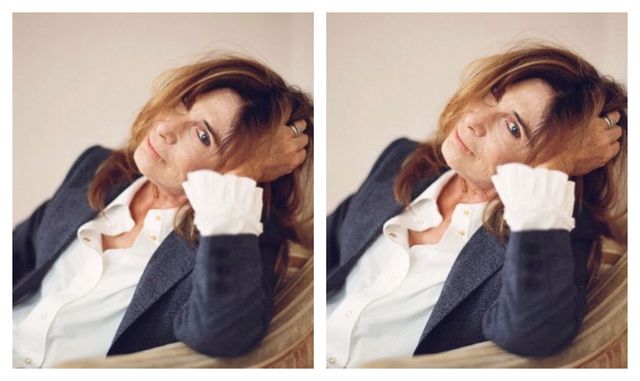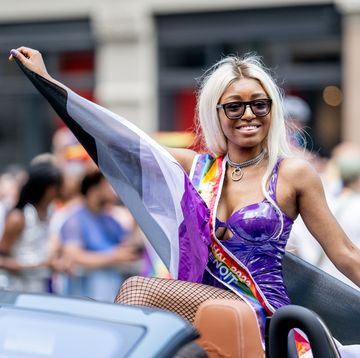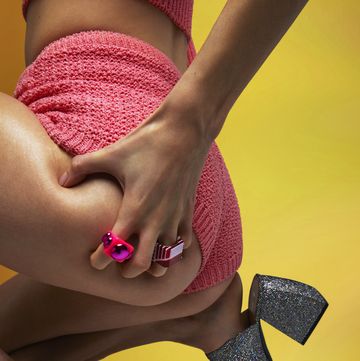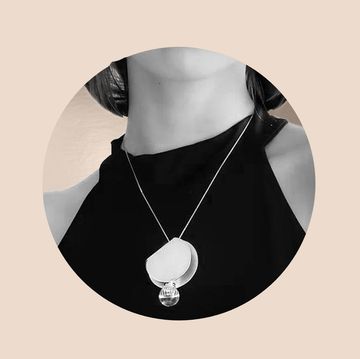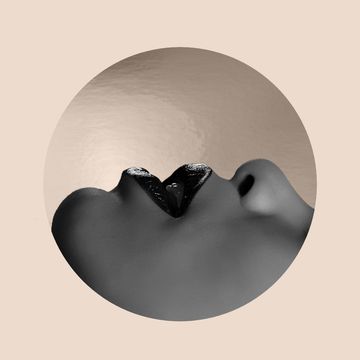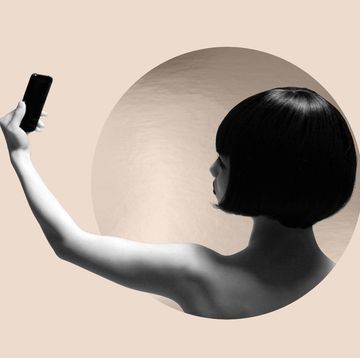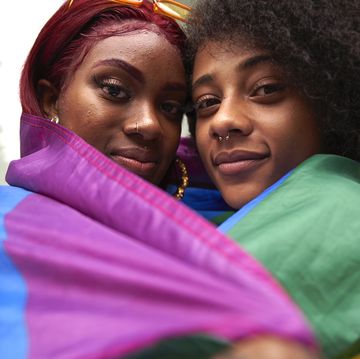Almost twenty years after she wrote her part fiction, part memoir, I love Dick, Chris Kraus became a cult icon for women all over the world, and the book became their feminist handbook.
Funny, brave and pioneering in its methods, vocal fans came in the form of Lena Dunham, Tavi Gevison and Alexa Chung, while Amazon quickly made a TV adaptation.
Chris' next book, After Kathy Acker (out now), had been an idea in her head ever since she penned I Love Dick in 1997. Writer, punk and renegade fashion icon Kathy Acker was a contemporary of Chris' and in the 80s they shared mutual friends, moved in the same circles and frequented the same New York art scene spots.
'The first time I saw her, her entrance was so dramatic,' explains Kraus. 'She was with an entourage so I didn't speak to her, I just saw her there and looked. She was very dramatic and glamorous and enviable. She radiated energy and charisma.'
After Kathy Acker presents a lesser known side to the somewhat divisive artist. Twenty years since Acker's death, ELLE speaks to Kraus about the real Kathy Acker, and what she can teach us about our attitudes to art, sex and relationships.
Was there anything you learned about Kathy that you hadn't expected?
I came to respect her a lot more after working on the book. The real revelation was how incredibly serious and disciplined she was, and when I started looking at her life in relation to her writing I came to understand what might from the outside seem like very bad life choices. She didn't really have a partner for her whole life and she was drawn to situations where the person was attached or married; situations that would end really painfully and dramatically. But if you look at them with her overall project - where advancing her writing and career was her highest goal - those choices although personally painful, often advanced that goal.
I think that's true of any person – if you start to look at someone's behaviour and life through the lens of their own motives it makes sense in a way that it doesn't from your own perspective. If you lend yourself to somebody else's point of view, their behaviour makes more sense. With Kathy I realised boredom and tranquillity were not very productive for her, drama and pain were great writing triggers.
Sex is a massive part of her work – what do you think she took away from working at sex clubs?
There are certain stories she repeats over and over again: the story of her mother's suicide, the story of her father's disappearance and the story of working in a sex club. Those become the myths of Kathy's writing, but I think the forays of the sexual revolution were much more damaging and much more critical to her life. That idea she stepped in to in the 70s was that you should just have sex all the time, sex was completely casual, you wouldn't know the person's name, you'd meet somebody at a party and you'd have sex with them and not have any expectations of having a relationship afterwards.
She suffered from that, as women did. I think later people realised that the sexual foray is much more suitable for conventional heterosexual male desire than for female desire. She might have had a lot of sex and no doubt she enjoyed it but also no doubt she was really very lonely a lot of the time and starved of connection, and looking for connection through sex.
What was the 'sexual revolution' really like?
It wasn't to me a period of glorious freedom at all. Not in terms of inclusiveness. There was this real double standard where women were supposed to adhere to the sexual value of completely emotionless casual sex as if that suited them and mostly it doesn't.
I think in that way it was a very confusing time for Kathy's generation, they were supposed to be benefitting from the freedom of the sexual revolution and yet this freedom seemed to dictate they used to sleep with any guy any time they wanted to, and that wasn't very rewarding. It was a very male-defined idea of sexual liberation.
Do you feel that attitudes shifted? Do women have more control?
Yeah and a lot of women have done really interesting work, like Moira Weigel's Labour of Love about the history of dating. It's a fantastic book and a lot of women have been paying attention to exactly these double standards. If women are at least 50% of the population, surely the values and needs of women should factor in equally to sexual forays.
What's your opinion on open relationships?
People are a lot more open now about fluid relationships and they work very well for some people and for others they don't. I think people go through phases, too. A fluid relationship might be perfect for 5 years and then suddenly it's not right anymore. That's been true in my own life.
There was a time when fluid or open relationships suited me very well, and then not. It's not as though one is right and one is wrong. They just serve different purposes at different times in your life. Sometimes openness and drifting is just as important as stability.
Do you think as a female writer it's difficult to write honestly about sexual desires?
I think the psycho part is a lot harder than the sexual part. That was true then, and it remains true now. There is nothing really taboo about sexuality. Even in Kathy's era when she made a psychosexual art project with Alan Sondheim, Blue Tape, they basically had an affair for 24 hours on video and they talked about their relationship non-stop when they weren't having sex. That was shocking then and it's shocking now. Whereas at that same time, Marina Abramovic was masturbating under a bridge in a gallery and Carolee Schneemann was unrolling a scroll from her vagina: the body is much more easily accepted than the awkward human things that have to do with the body. Relationships are much more difficult to talk about than sex.
What advice would you give to your younger self about sex and relationships?
I know I would never have taken this advice, because if something is important, you think about it all the time, but, I'd tell myself, 'go for it! Stop thinking about everything so much!'
After Kathy Acker is on sale now
